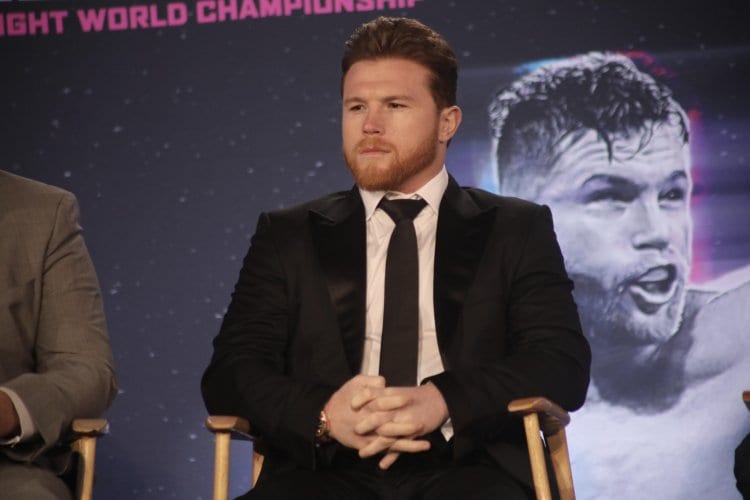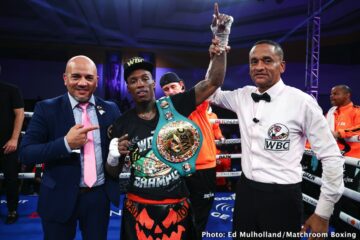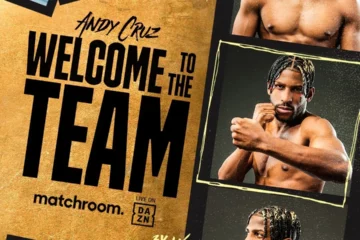DAZN, A Case Study in Boxing’s Popularity in the U.S.
A brief history of the streaming service,
The concept was simple, if you like sports, buy our monthly sports subscription service and
Things haven’t been all rosy at DAZN for a number of reason – one of which being it doesn’t have the top two American sports on the network – that being football and basketball.
It seems it will be a no-brainer that DAZN will be in the running when those rights come up for the NBA and NFL, and John Skipper, the one in charge at DAZN, is known for gobbling up rights to sports properties, as he did during his tenure at ESPN.
What is truly noticeable about DAZN in its infancy in America is how much boxing has an impact on the culture at large (or not) and if boxing alone can sustain a business based around sports programming, as boxing is the major sport they’re promoting and selling subscriptions with.
DAZN right now offers arguably the most marquee fighters in boxing from pound-for-pound number one fighter “Canelo” Alvarez, heavyweight world champion Anthony Joshua as well as a beloved middleweight Gennady Golovkin. That being said, just last week, nearly a month before “Canelo” Alvarez faces Daniel Jacobs at the T-Mobile Arena in Las Vegas, Nevada, on May 4th, we saw changes to the DAZN subscription plan.
PPRICE POINT
The original offer of $9.99 a month was done away with and replaced with a flat fee of $99.99 for a whole year, which is cheaper than the original plan, but at a month-to-month rate, or individualized pay-per-view price it’ll now be $19.99 a month. Also, notable that the free trial is no longer available. For those who had subscribed to the original rate of $9.99, they will only be billed that fee all of this year, with a price change taking place next year for them.
So now it comes down to how much do people love boxing and can it stay the course as DAZN looks to gain the rights to a major American sport in a forthcoming bidding war in the near future. DAZN currently offers content from Matchroom Boxing USA, Golden Boy Promotions, Bellator MMA and forms of MLB programming, mostly a dialogue show. The answer seems to be yes, but as a devout boxing fan that I am, I do notice, outside of the major stars of their network, a lot of fighters come and go with little culturally impact on their platform.
Canelo, Golovkin, and Joshua have all been a part of bouts that have pulled in huge live gate numbers with Canelo and Golovkin making nearly 50 million dollars alone in two fights in just the live gate, and Joshua having 80,000-90,000 fans packed into arenas. Investing in these fighters, who have monetized their stardom, you’d think would be financially fruitful.
On top of that, boxing is one of the older and more archaic sports, and quite simply, using an app, and streaming boxing
Now, this isn’t an indictment on their platform as fighters come and go often in boxing on all networks, but it speaks to boxing as a whole. Boxing isn’t a business that a start-up company looking to be a major sports broadcasting entity has built upon in the United States since maybe ABC’s “Wide World of Sports”, decades ago – the current state of money in the sport would say otherwise. It could work, and I hope it does, but it also requires a lot from boxing fans, who get somewhat abused with bad boxing match-ups from time-to-time as well as abuse the sport themselves by not supporting or investing money and/or time into bouts that help grow the sport. Thus we tend to be in a stagnant spot every year with good fights and bad fights alike, not unlike a swimmer treading in water.
Boxing is the red light district of sports. One in which criminals freely roam and are praised for past performances in and out of the ring and reporters are mocked if you brought up questionable issues in their character of that aforementioned individual. In short, boxing isn’t really a mainstream sport, but DAZN, I guess, is hoping that the current anarchy in America, might help in an uptick in boxing viewership? Or did I just overthink everything and is it simply that boxing rights were the easiest to acquire and that they’re overpaying fighters in order to create desirable content that can be used as leverage to work out deals with bigger sports in the future? Or is boxing more popular than ever, and it will just lead to
The big worry I have right now is boxing is in a finical boom with streaming services and great live gate numbers for desirable fights, but what if it doesn’t create a net-positive, but rather a net-negative, meaning it creates a loss of money rather than the allocation of funds. DAZN’s model is to basically cater to hardcore boxing fans, giving them the content they use to stream from seedy, malware infected websites to watch world ranked fighters fight in obscure countries or bring those fights to America and/or Great Britain with better production value. While also hoping that fans of the major fighters on the network will buy subscriptions yearly even if they don’t watch every bout the service offers, they still view it as a value-laden investment based off their marquee tentpole events and a yearly plan being cheaper than month-to-month.
Fighters like two-division world champion Demetrius Andrade, IBF super featherweight world champion Tevin Farmer and even popular super lightweight Regis Prograis have benefited finically from the DAZN service, but the big question now will be, will the big fighters (Canelo, Golovkin, and Joshua) bring home the return on investment? Also, will some of these younger fighters like Diego Pacheco turn into stars down the round, getting built from the ground up.
The sales pitch for DAZN is essentially for the price of little over one pay-per-view, you get a year of boxing content with it. The downside for some might be that the fighters are nuanced and at times in developmental stages even if they hold a world title, that might not engage all, as well as the
DAZN is now becoming a case study of how important boxing is an America. If DAZN is a success, boxing is back, if it doesn’t boxing will more than likely ended up further and further on these streaming sites until they end up on Tor. Boxing will always have a place in America, and someone will always invest in it, but DAZN will show what our ceiling as a sport quite possibly could be since they have money, stars, and the willingness to put on some shows of interest.





